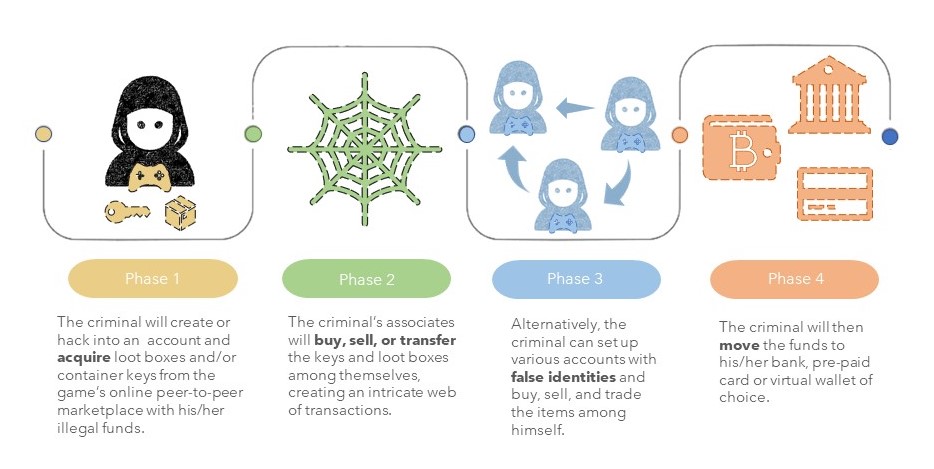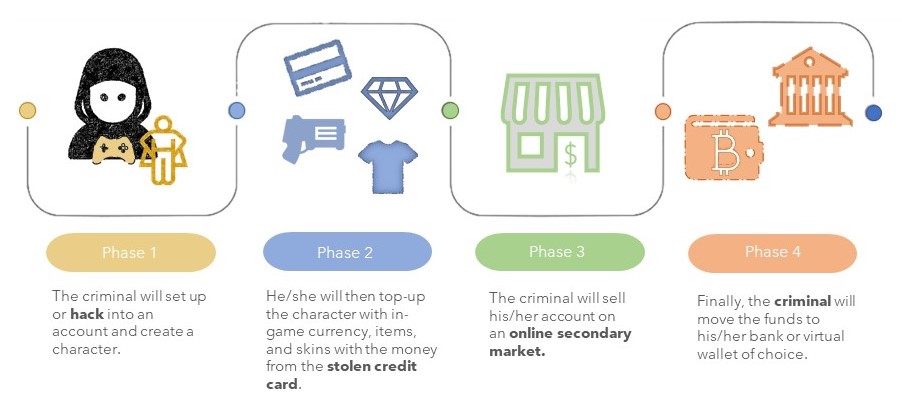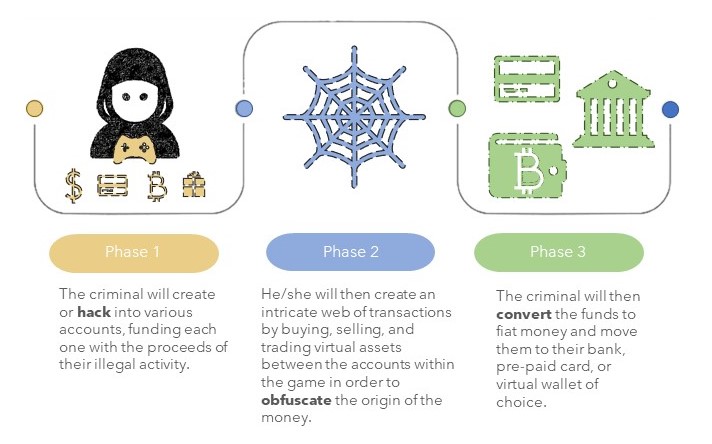As common channels for money laundering, such as real estate, online gambling, and shell corporations, have become more scrutinized through rigorous Know Your Customer (KYC) rules and ownership requirements, criminals have flocked towards avenues with little to no regulation.
The video game industry, particularly the market of online multiplayer games, has seen a surge of nefarious activity in recent years due to its unregulated status by local and international organizations, few to none Know Your Customer rules, ease of transfer of in-game currency, and crowded platforms that allow criminal transactions to get lost in myriads of legitimate ones.
With the gaming industry in constant growth, and projected to hit a staggering $298 billion by 2027, money laundering related to criminal activities is expected to rise.
What are in-game currencies?
There are two common types of in-game currencies:

- A player can exchange real fiat for the game’s currency, then back.
Many of these types of currencies have a fluctuating exchange rate and a designated exchange platform. A player may use this kind of currency to create, sell, or exchange items with other players in the game, or invest in the game’s virtual properties or assets.
In 2013, the United States Financial Crimes Enforcement Network (FinCEN) issued guidance concerning the exchange and administering of virtual currencies, turning the Linden Dollar, the currency of Second Life, into a convertible centralized virtual currency, and the company who created the game, Linden Lab, into a Money Services Business (MSB) subjected to AML and KYC regulation.
Popular online games that use convertible in-game currencies are Second Life, Entropia Universe, and Roblox.

- A player can exchange real fiat for the game’s currency, but not back.
This currency can only be used within the game to buy skins, weapons, or power-ups for the player’s avatar to personalize his/her character within the game but cannot be traded with other players or invested officially.
It serves as a large portion of the global gaming industry’s revenue and is the most common type of in-game currency. Some of the best selling games at the moment, and the ones with the largest number of players and hours spent playing, utilize this type of currency. Many of these games are also free to download and monetize through the sale of non-convertible in-game currencies.
Popular online games that use non-convertible in-game currencies are Fortnite, PlayerUnknown’s Battlegrounds (PUGB), and Apex Legends.
How is money laundered in online video games?
Indeed, they easily cover their tracks and do not draw attention to them beyond the fact that the video game industry is not or very loosely regulated.
A criminal may download a free online game on their PC, phone, or tablet, then proceed to create a character or an avatar. Alternatively, they can also hack an already existing account to further protect their identity.

Most online games only allow the player to acquire items through microtransactions, meaning that most currencies, skins, or weapons can be bought with fees that are below $200. This allows criminals to cover their traces easily and not drawn attention to themselves.
What are some methods of laundering money through video games?
The best known of these methods are: the use of loot boxes, considered as a form of gambling and banned by Belgium; carding (use of stolen credit cards); the use of convertible virtual currencies.
Loot boxes and keys can be traded between players in the Steam marketplace, one of the largest online gaming retailers. Vice reported that 90% of transactions worldwide related to loot boxes were carried out for the laundering of illicit funds. Valve, the company responsible for the game, has since shut down its online marketplace.


Delinquents would create a new account, or hack into an existing one, use stolen cards to top-up their avatar with the game’s currency, skins, or weapons, and sell the items or their account at a discounted price on third-party markets or the dark web.
The company responsible for the creation of the game, Epic Games, has made it clear in its end-user license agreement that selling the game’s virtual assets on secondary markets is not allowed. However, a quick check on eBay for Fortnite items yielded a surprising 2.107 results at the time of the article with skins, weapons, currencies, and accounts up for sale.
In October of 2019, the Royal United Services Institute (RUSI) discovered that a group of criminals had used stolen credit card details to create a vast number of Apple IDs to buy in-game items in such online games as Clash of Clans or Marvel Contest of Champions, later selling the items on secondary markets for fiat currency.
The launderer can then purchase and sell assets amongst the fake accounts, creating an intricate web of transactions. The money can later be transferred to various bank accounts where the criminal can cash-out the money directly from the bank of through an ATM. Tracing the source of funds would be extremely hard.
What is being done to counter money laundering in video games?
In June of 2019, FATF added an interpretive note to Recommendation 15 in relation to virtual asset activities and service providers, particularly related to money laundering and terrorist financing. The note puts forth approaches to regulating and supervising virtual asset service providers (VASPs). A game company that sells virtual currencies may be considered a VASP. Many disagree with this notion, stating that many in-game items are not intended to be traded or sold on unauthorised third-party websites and that game developers shouldn’t bear the burden of AML/CTF regulation.

Companies that created online video games using convertible currencies should be considered as such due to their similarities to money services businesses, just like Linden Lab. However, developers of games using non-convertible currencies should face a lighter set of requirements as illegal activity is relegated to outside the game.

As money laundering continues to grow in online video games, regulators will become more active in clamping down on illegal activity, slowly transforming an unregulated sector into a vigilant and AML compliant industry in the future.











I really enjoy reading your posting.
Thank you very much for your support Naim! It is very much appreciated.
This article helps me a lot. Thanks for sharing valuable information. As I was looking for such information, Anti Money Laundering Certification Free I hope you get more information.
Well, this is an awesome post and written very well. Your point of view is very good. Thanks for sharing, and keep posting good content.
Great informative article. Can you share what you know also about physical and more fungible items such as video games in boxes and sports cards being used to launder money? I cannot believe that the prices being spent on physical copies of video games and sports cards to the tune of over a million dollars is legitimate.
Thanks for sharing great information.your point of view is good and good blog content
Great Information, thanks a lot. I have just started to research on this topic of carding and money laundering. One of the best articles I've read so far.
Very informative article thanks. One question, which I think is overlooked, what about cards that can be bought in supermarkets and convenience stores, to top up online accounts. I'm thinking €50 cards to top up a PS plus account/Xbox account. Can these also be used in a laundering scheme? Thanks in advance.